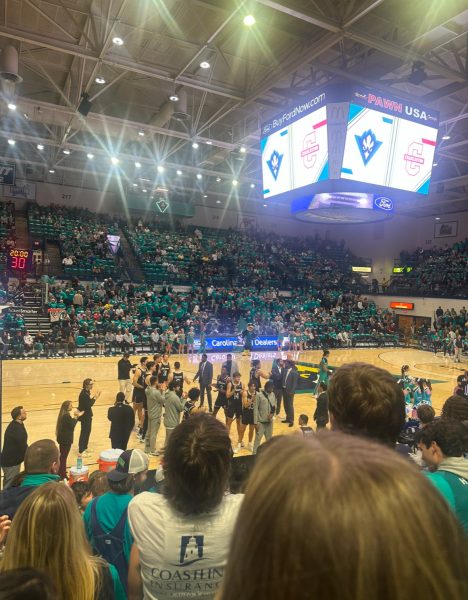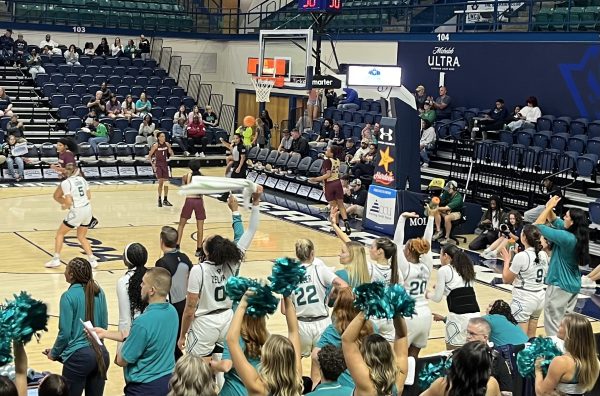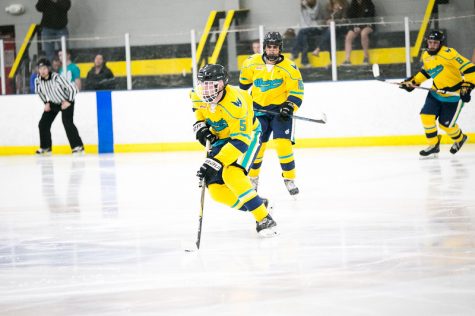Quidditch Club gaining steam on campus
If you’ve seen any of the Harry Potter films, you may already know the basics of the sport. There’s a ball, there’s a goal, there’s a “golden snitch,” and there are also flying brooms. Now, if any of those aforementioned facets strike your fancy, you can delve into the sport of Quidditch a little deeper with the club sport’s growing popularity at UNC Wilmington.
The sport is not only gaining momentum at UNCW, but many schools throughout the country as well. According to a recent article by USA Today, about 200 colleges and universities have club teams that play Quidditch.
That sprouting interest in the sport was a key factor in UNCW Quidditch club president Olivia LeMay’s college decision. Lemay, a sophomore, said she had an eye on universities that had a Quidditch team when applying to schools, and knew she wanted to join as soon as she began attending UNCW.
“The best thing about playing college Quidditch is the people that you meet,” LeMay said. “Most of them are super creative and outgoing. There’s a mix of non-athletes and hard-core athletes.”
Diving into the specifics of the sport, Quidditch can best be described as a cross between rugby and dodgeball. Seven players from each team are on the field at once, including a keeper who protects the goal, two “beaters” who offensively ward off the other team from scoring and wield the Bludger balls, three “chasers” who attempt to score goals with “quaffle” balls, and, finally, a “seeker,” whose solitary aim is to catch the ever-evasive Golden Snitch.
Slightly deflated volleyballs and dodgeballs stand in for quaffles and “bludgers,” the magical flying balls used in the Harry Potter novels. The Golden Snitch is substituted with a tennis ball, placed in a sock, and tucked into someone’s waistband. Though catching the Snitch in the book is worth a game-changing 150 points, in college Quidditch it is worth a mere 30 points. This allows for a game to be won or lost based more on scoring with the quaffle ball through the three upright hoops, where each goal is worth 10 points.
Much of the game rules remain faithful to Rowling’s books, with one obvious exception: while Hogwarts students can fly, Muggles, the players, of course, cannot. The concession made to that is that all players must hold a “broomstick” of sorts—often actually a piece of PVC pipe— between their legs while on the field. Another difference is that Beaters don’t use bats to hit the Bludgers, or their teammates. Both LeMay and her teammate, freshman Jessica Baron, said the one thing they thought most people would find surprising about Quidditch is how taxing the game is physically. No padding is worn, and players have suffered broken legs, collarbones, and concussions. Most injuries seem to arise from falling with the broom, creating awkward landing angles. Without a bottle of Madame Pomfrey’s Skele-Gro, the magic potion that heals bone-related injuries in the Harry Potter books, those injuries can prove serious.
In an effort to balance the risk of injury, no more than four members of one gender can play on a team at any one time. This promotes both a more evenly-matched playing field in terms of physical size and strength, and a sense of gender equality. The team, as it is now, is comprised of approximately half male and half female players, and numbers around two dozen.
As is with other club sports, everyone tries out for the team is given a spot. With the Quidditch Club, nearly everyone—at least 90% of the team—are fans of Harry Potter, according to LeMay, giving the group something to bond over above and beyond the athletic aspects of the game.
While the sport is gaining in popularity throughout the United States, initially telling people you play Quidditch still draws skeptical looks.
“The worst thing about playing Quidditch is telling people I play Quidditch,” LeMay said with a laugh. “We want to be taken seriously.”
LeMay continued to note that non-players often don’t understand the demanding physical nature of the sport or appreciate the communal aspect of playing a game based on something that most players enjoyed reading and watching before the sport ever came into being.
The club participates in two to three tournaments per semester. There is also a Quidditch World Cup, often held in a large city on the East Coast, where Quidditch teams from all over the US congregate to play, with approximately 100 teams competing each year.











